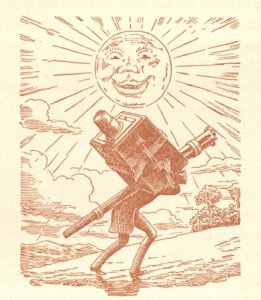CfP: Nomadic Camera. Photography, Displacement and Dis:connectivities, 13-15 jun 2023
 Nomadic Camera. Photography, Displacement and Dis:connectivities
Nomadic Camera. Photography, Displacement and Dis:connectivities
Workshop at the Käte Hamburger Research Centre Dis:connectivity in Processes of Globalisation (global dis:connect), Ludwig-Maximilians-Universität Munich
13–15 June 2023
Organisers: Burcu Dogramaci (Käte Hamburger Research Centre, LMU Munich), Winfried Gerling (European Media Studies – University of Applied Sciences Potsdam/University Potsdam and Brandenburg Centre for Media Studies (ZeM), Potsdam), Jens Jäger (University of Cologne) and Birgit Mersmann (University of Duisburg-Essen)
Processes of migration and flight after 2015 and their depiction, perception and distribution through photography form the initial point of the workshop and subsequent publication Nomadic Camera. The research project seeks to investigate the technical, medial and aesthetic relationship of photography and contemporary migration, historical exile and flight as the pivotal discursive setting in which specific forms of mobility extending from the mid-nineteenth century to today have been negotiated.
The concept adapts the term ‘nomadic’ — a transitory form of existence — beyond static concepts of being and national boundaries (Demos 2017). ‘Nomadic’ refers to a form of mobility that establishes continuities and discontinuities with other terms, such as ‘travel’, ‘displacement’ and ‘exile’ (Kaplan 1996). At the same time, displacements are intrinsically related to experiences of connectivities and disconnectivities, including place-making and belonging, ruptures between life and work in the past and present, experiences of loss and challenges of beginnings.
Viewing photography as a formative part of this history of mobility and migration, we will examine the interconnection between the concepts of ‘nomadic’ and ‘camera’. From its introduction in the early-nineteenth century and throughout numerous technical developments and innovations, photography has been a mobile medium closely tied to equipment, social conditions and cultural framings. Setting out from this hypothesis, the workshop and publication “Nomadic Camera” will centre around the following questions: how are dislocations interconnected with the technical evolutions of the mobile medium of photography? In which way do camera technologies presuppose and affect the visual formulation of exile, migration and flight experiences? What modifications in aesthetics and style, methods and practices of photography do temporary mobility, geographical relocation and resettlement imply?
The workshop organisers seek contributions that analyse the interrelation of photography and displacement from a variety of interdisciplinary perspectives and diverse methodologies, theoretical approaches and thematical framings. The workshop and the resulting publication will be arranged into four main sections:
Section A: Techniques, technologies
Section B: Body, agents, performativity
Section C: Media narrations, narratives
Section D: Circulation, archive, memory.
We invite also artistic visual essays in addition to scholarly contributions.
The Käte Hamburger Research Centre will cover hotel and return travel costs within Europe or, for those coming from other continents, a significant portion of return flights (details determined after acceptance) for those invited to present. The workshop will be in English. Presentations should be 30 minutes in length. Remote participation will be possible, as the workshop will be held in hybrid form.
Expanded, elaborated contributions based on selected talks from the workshop will be published in an edited volume. Final drafts must be submitted by 15 November 2023. Applicants should note the turn-around time between the workshop and the final submission date.
Proposals of up to 300 words should indicate the preferred section. Please send them along with a half-page CV to Burcu Dogramaci (burcu.dogramaci@lmu.de), Winfried Gerling (winfried.gerling@fh-potsdam.de), Jens Jäger (jens.jaeger@uni-koeln.de), Birgit Mersmann (birgit.mersmann@uni-due.de) by 15 November 2022.





